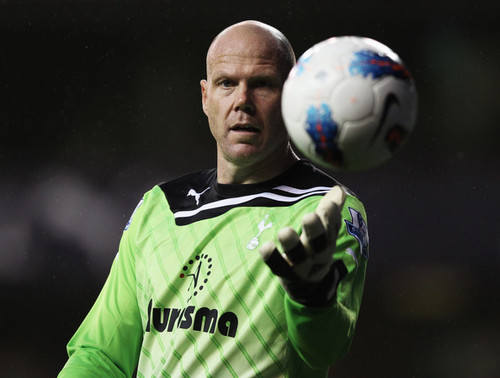
Brad Friedel, amongst his peers, still going strong at 41 years old
A recent post by Jamie Trecker poses the question will the USA ever win the World Cup? And when will the USA ever produce its own Pele, if ever?
Trecker goes on to say that the USA has always produced top quality goalkeepers, the country’s most visible export to overseas leagues in this sport. In contrast, they have lacked quality in the outfield with some notable exceptions like Clint Dempsey and Landon Donovan. Not so goalkeepers as Kasey Keller, Brad Friedel, Tim Howard, Brad Guzan, Marcus Hahnemann, have all been amongst their peers.
Why are US goalkeepers so good? Trecker doesn’t quite address that as his focus obviously lies elsewhere. But it is worthy of examination and debate. What gives goalkeepers here the qualities to compete with the best in the world?
The answer probably lies in the ethos of specialization that are an overt characteristic of almost every American sport. Simply put, sports over here offer a spectrum of specialist positions unmatched in the world. The analogy would be going to music school to learn the clarinet, the oboe, the violin. You are characterized as a musician but you are skilled at playing a particular instrument. In the NFL, you have your pick of teams, offensive, defensive, special, kicking, punting. There are plays built around these specialist positions involving tight ends, running backs, full backs, three receiver sets, quarterback sneaks, etc. Baseball is no less intricate where the basemen and the outfielders are clearly delineated. A designated hitter can bat but he can’t take part in anything else. A pitcher has about 6 types of pitches he can throw and spends a lifetime mastering some of them. In this environment inculcated at an early age, a youngster interested in sports already has a reverence and appreciation for these qualities.
In soccer, the one position above and beyond any other position that requires such specialization is that of goalkeeper. The rest are more or less built around spatial requirements with certain physical and technical attributes that make them attractive in that position. Gravitating towards goalkeeping if interested in soccer is a self selecting process and probably attracts better athletic talent given its degree of specialization. A characteristic of most goalies is that were also good enough at basketball to consider a future in that sport. Which brings us to why the NCAA driven process of developing sport talent is considered so detrimental to soccer but has not done anything to slow down the influx of good goalkeeping talent. An academic set up facilitates imbibing the more technical aspects of such specialization in a compressed amount of time after the nuts and bolts learned in high school.
Such latencies are detrimental to any other position where the early advent of specialized coaching makes all the difference as pointed out by Trecker in the same post. Goalkeepers in general develop much later in life. Strikers and midfielders slowed down by wear and tear hang up their boots by the early to mid 30s, which is when a goalkeeper is at the top of his game. Friedel is turning 41 this year, which means Brad Guzan at 27 years of age can look forward to another decade in the top rungs if all goes well. In short, the US produces good goalkeepers because it attracts better talent and the university set up provides an advantage in honing those skills.
2 comments on “Why are US goalkeepers so good?”
Interesting post. I, too, have wondered the same thing. And as a American goalkeeper who played at the NCAA Division-I college level, I always liked the idea I once heard mentioned by Nick Webster of Fox Soccer. That is that American kids grow up developing hand-eye coordination at an early age and so are ahead of the curve of the rest of the world, relatively speaking, in terms of goalkeeper skills. What American kid cannot throw and catch a football or baseball or shoot and catch a basketball. All of these driveway/backyard games require hand-eye coordination in spades. It struck home when we were tailgating for a USA WC qualifier in Hartford prior to the 2006 WC several years back. Ironically enough, a bunch of us yanks were throwing an American football around and several euros amongst our group were woeful at catching and throwing.
Good point, Kev. That early headstart in hand-eye co-ordination skills is really important. And all American sports really emphasize that aspect of catching and throwing. I still remember Tim Howard’s amazingly quick, deep, and accurate throws which would kickstart those US counterattacks.